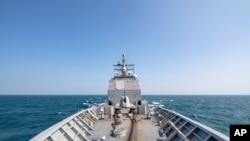A $6.9 billion U.S. military initiative that's moving through the Senate would aid beleaguered Taiwan and Vietnam by thwarting major threats from their rival China, analysts say.
Senators are working on the Pacific Deterrence Initiative with a budget of $1.4 billion in the initiative's first year for U.S. military activity in Asia and $5.5 billion in its second year. The bill is seen as an outgrowth of the 2018 Asia Reassurance Initiative Act and is expected to bolster U.S. naval forces in the Western Pacific.
U.S. funding isn't allocated yet but would help Taiwan, analysts believe. China has flown military aircraft into the island's air defense zone five times since June 9. Or it could bolster Vietnam – China sent a survey ship earlier this year into the Southeast Asian country's exclusive economic zone.
Beijing claims self-ruled Taiwan as its own and vies separately with Vietnam over sovereignty in western parts of the South China Sea. U.S. officials see China as a rival superpower and smaller Asian governments, including Taiwan and Vietnam, as allies in containing Chinese maritime expansion.
"Obviously, China will certainly have very negative and very antagonistic attitudes toward this kind of consolidation of the military cooperation," said Andrew Yang, secretary-general of the Chinese Council of Advanced Policy Studies think tank in Taiwan.
The Pacific Deterrence Initiative sends a "strong signal to the Chinese Communist Party that America is deeply committed to defending our interests in the Indo-Pacific," the Senate Armed Services Committee said in its 2021 budget act.
Specifically, the initiative would "focus resources on key military capability gaps," reassure U.S. allies, and improve the "credibility" of American deterrence, the committee said. U.S. forces should look at building runways, adding theater missile defenses and improving command, former U.S. assistant secretary of defense Randy Schriver wrote in a March 10 commentary.
The 2018 act calls for supporting a close security relationship with Taiwan and encourages visits to Taiwan by high-level U.S. officials. That act, which followed a period of confusion in Southeast Asia about U.S. President Donald Trump's strategy for the region, further directs the U.S. government to deepen "security cooperation" with Vietnam.
For the initiative being formulated now, "I think the overall direction is that 'well, since we have identified China as a near peer military competitor, what are we doing about it, and when are we going to strengthen in order to effectively compete with China?'" said Yun Sun, East Asia Program senior associate at the Stimson Center, a research organization in Washington.
Vietnam is due this year to receive a second U.S. Coast Guard cutter for its own coastal defense. The U.S. Navy has sent warships seven times this year to date through the strait separating China from Taiwan, comforting Taiwanese people and angering Beijing.
A Chinese researcher cited by China Global Television Network sees the latest U.S. plan as an extension of policy to weaken Chinese influence in Asia by working alongside third countries.
The initiative would "attract some countries to plan to establish bilateral or multilateral security cooperation mechanisms to contain China's maritime activities," wrote Lan Shunzheng, a research fellow at the Beijing-based think tank Charhar Institute.
'High-end' deterrence
Extra funding from Washington would allow "high-end" deterrence against China, said Euan Graham, senior fellow with the Singapore-based International Institute for Strategic Studies. But U.S. forces will still find it hard to overcome China's long-term hold over Asian waters, he said.
"U.S. can deter high-end aggression from China against Taiwan much more easily I think than it can this kind of (Chinese) strangulation exercise, which is much more a persistence, stamina game, and the problem with the U.S. is it can't deploy indefinitely," Graham said.
Beijing uses its navy, coast guard, fishing fleets and economic incentives to occupy disputed islets in the South China Sea.
U.S. allies Malaysia and the Philippines also contest Chinese claims to the 3.5 million-square-kilometer sea but get along better with Beijing diplomatically than Vietnam does.




